ড. মোঃ গোলজার হোসেন কুড়িগ্রামের ভুরুঙ্গামারী উপজেলার একজন কৃষক পরিবারে জন্মগ্রহণ করেন। মাধ্যমিক শিক্ষা স্থানীয় বিদ্যালয় থেকে ২০০৩ সালে এবং উচ্চ মাধ্যমিক শিক্ষা ভুরুঙ্গামারী ডিগ্রী কলেজ থেকে ২০০৫ সালে সম্পন্ন করেন। ২০০৬ সালে তিনি বাংলাদেশ কৃষি বিশ্ববিদ্যালয়ের ভেটেরিনারি অনুষদে ভর্তি হন এবং ২০১০ সালে “ডক্টর অব ভেটেরিনারি মেডিসিন” (ডিভিএম) ডিগ্রি অর্জন করেন।
২০১২ সালে তিনি একই অনুষদের মাইক্রোবায়োলজি ও হাইজিন বিভাগ থেকে মাস্টার্স অব সায়েন্স ইন মাইক্রোবায়োলজি ডিগ্রি অর্জন করেন এবং রাষ্ট্রপতি গোল্ড মেডেল পান। এরপর প্রভাষক হিসেবে যোগদান করেন। ২০১৪ সালে জাপানের ওসাকা বিশ্ববিদ্যালয়ে MEXT বৃত্তি নিয়ে পিএইচডিতে ভর্তি হন এবং ২০১৮ সালে পিএইচডি ইন মেডিকেল সায়েন্স ডিগ্রি অর্জন করেন। বর্তমানে তিনি জাপান এজেন্সি ফর মেডিকেল রিসার্চ অ্যান্ড ডেভেলপমেন্টের অর্থায়নে পোষ্ট-ডক্টরাল গবেষক হিসেবে হেপাটাইটিস বি ভাইরাস নিয়ে গবেষণা করছেন।
ড. গোলজার হোসেনের প্রধান গবেষণা ক্ষেত্র হলো হেপাটাইটিস বি ভাইরাসের প্যাথফিজিওলজি, ভাইরাসের মিউটেশন, হিউম্যান কোষের প্রোটিনের সাথে ভাইরাসের ইন্টারঅ্যাকশন এবং নতুন ভ্যাকসিন, ডায়াগনস্টিক কিট ও এন্টিভাইরাল ঔষধ উন্নয়ন।
💬 প্রশ্নোত্তর পর্ব:
প্রশ্ন: আপনার সমন্ধে আমাদের একটু সংক্ষিপ্ত বলুন।
উত্তর: প্রথমে বিজ্ঞানী.অর্গ কে ধন্যবাদ আমার সাক্ষাতকার গ্রহণের জন্য। আমার জন্ম কুড়িগ্রাম জেলার ভুরুঙ্গামারী উপজেলার প্রত্যন্ত এক গ্রামের একটি কৃষক পরিবারে, এবং আমার বাবা একজন কৃষক ও মা গৃহিণী। এই পরিচয় দিতে আমি সবসময়ই স্বাচ্ছন্দ্য ও গর্ববোধ করি। আমি স্থানীয় বিদ্যালয় থেকে মাধ্যমিক, ভুরুঙ্গামারী ডিগ্রী কলেজ থেকে উচ্চ মাধ্যমিক পাশ করি। ২০০৬ সালে বাংলাদেশ কৃষি বিশ্ববিদ্যালয়ের ভেটেরিনারি অনুষদে ভর্তি হয়ে ২০১০ সালে ডিভিএম ডিগ্রি অর্জন করি। ২০১২ সালে মাস্টার্স ডিগ্রি অর্জন করি এবং রাষ্ট্রপতি গোল্ড মেডেল পাই। ২০১৪ সালে জাপানের ওসাকা বিশ্ববিদ্যালয়ে পিএইচডিতে ভর্তি হয়ে ২০১৮ সালে পিএইচডি ডিগ্রি অর্জন করি। বর্তমানে সেখানে পোষ্ট-ডক্টরাল গবেষণা করছি।
প্রশ্ন: বর্তমানে আপনি কি নিয়ে গবেষণা করছেন?
উত্তর: আমি হেপাটাইটিস বি ভাইরাস নিয়ে গবেষণা করছি। এই ভাইরাস লিভার ক্যান্সারের কারণ। একবার আক্রান্ত হলে রোগীর লিভার থেকে ভাইরাসের ডিএনএ সম্পূর্ণভাবে সরানো সম্ভব নয়। এন্টিভাইরাল ঔষধ প্রয়োগে কখনও কখনও রেজিস্ট্যান্ট ভাইরাস তৈরি হয়। নতুন মিউটেটেড হেপাটাইটিস বি ভাইরাসের কারণে পুরাতন ভ্যাকসিন ও ডায়াগনস্টিক কিট অনেক সময় কার্যকর হয় না। আমি ভাইরাসের প্যাথফিজিওলজি, বংশবিস্তার এবং হিউম্যান কোষের প্রোটিনের সাথে ইন্টারঅ্যাকশন খুঁজে বের করছি, যা নতুন ডায়াগনস্টিক কিট, ভ্যাকসিন এবং ঔষধ তৈরিতে সহায়তা করবে।
প্রশ্ন: আপনার গবেষণা ভবিষ্যতে কোন কোন ক্ষেত্রে কাজে লাগতে পারে?
উত্তর: গবেষণার ফলাফল ভবিষ্যতে নতুন ডায়াগনস্টিক কিট, ভ্যাকসিন এবং এন্টিভাইরাল ঔষধ তৈরি করতে সহায়তা করবে। বাংলাদেশে হেপাটাইটিস বি গবেষণা কম হওয়ায়, স্থানীয় ভাইরাস আইসোলেট থেকে দেশীয় ভ্যাকসিন বা কিট তৈরি করা সম্ভব হবে। এছাড়াও আমি ক্যাপোসি’স সারকোমা অ্যাসোসিয়েটেড হারপেস ভাইরাস নিয়ে কাজ করেছি, যা ব্লাড ক্যান্সারের গবেষণায় সহায়ক হবে।
প্রশ্ন: ভাইরাস ও জীবাণুর কোন দিকটি সবথেকে আপনাকে আশ্চর্য করে?
উত্তর: ভাইরাস অতিক্ষুদ্র হলেও এটি মানুষের কোষে প্রবেশ করে কোষের কাজ পরিবর্তন করতে পারে এবং ক্যান্সারসহ মারাত্মক রোগ সৃষ্টি করে। অন্যদিকে গবেষকরা রিকম্বিনেন্ট ভাইরাস ও ব্যাকটেরিয়া ব্যবহার করে মানব কল্যাণে যেমন ইন্সুলিন ও হরমোন উৎপাদন করছেন, তা আশ্চর্যজনক।
প্রশ্ন: রোগ-জীবানু সময়ের সাথে সাথে আরো “স্মার্ট” হচ্ছে, এর কারণ কি?
উত্তর: প্রাকৃতিক ও জলবায়ু পরিবর্তনের কারণে নতুন মিউটেটেড ভাইরাস বা ব্যাকটেরিয়া সৃষ্টি হচ্ছে। এছাড়াও অপ্রয়োজনীয় এন্টিবায়োটিক বা এন্টিভাইরাল ব্যবহারের ফলে জীবাণু মিউটেশন ঘটিয়ে রেজিস্ট্যান্স তৈরি করছে।
প্রশ্ন: বিজ্ঞানী হওয়ার জন্য কে আপনাকে বেশি উৎসাহ দিয়েছেন?
উত্তর: আমি কৃষকের ছেলে। বাংলাদেশ কৃষি বিশ্ববিদ্যালয়ের প্রফেসর ড. সুকুমার সাহা ও প্রফেসর ড. মো. আলিমুল ইসলাম আমার গবেষণার আদর্শ। তাঁদের অনুপ্রেরণা এবং দেশীয় প্রাণীরোগ গবেষণার উদাহরণ আমাকে বিজ্ঞানী হওয়ার পথে উৎসাহ দিয়েছে।
প্রশ্ন: বাংলাদেশে তরুণদের সঙ্গে আপনার কাজের অভিজ্ঞতা কেমন?
উত্তর: বাংলাদেশ কৃষি বিশ্ববিদ্যালয়ের তরুণদের সঙ্গে এখন গবেষণা করছি। তারা ব্যাচেলর তৃতীয় বর্ষ থেকেই গবেষণায় মনোযোগ দিয়েছে। মার্কিন যুক্তরাষ্ট্রের মার্ক অ্যানিম্যাল হেলথের সঙ্গে যোগাযোগের মাধ্যমে তারা গবেষণা বৃত্তি পেয়েছে। এটি তরুণদের মধ্যে গবেষণার আগ্রহ বাড়াচ্ছে।
প্রশ্ন: বাংলাদেশ ও জাপানের বিজ্ঞানীদের মধ্যে মৌলিক পার্থক্য কী?
উত্তর: বাংলাদেশে মৌলিক গবেষণা কম হয় এবং বিজ্ঞানীদের গবেষণার বিষয়বস্তু বিস্তৃত। জাপানে গবেষণার বিষয়বস্তু নির্দিষ্ট ও দক্ষতার মান আধুনিক। ফলে জাপানে নতুন প্রযুক্তি উদ্ভাবন ও রপ্তানি সম্ভব হচ্ছে।
প্রশ্ন: আপনার ভবিষ্যত পরিকল্পনা কী?
উত্তর: পোষ্ট-ডক্টরেট শেষ করে বাংলাদেশ ফিরে এসে বাংলাদেশ কৃষি বিশ্ববিদ্যালয়ে গবেষণা ও অধ্যাপনায় মনোনিবেশ করব। অর্জিত দক্ষতা ব্যবহার করে হেপাটাইটিস বি এবং অন্যান্য অনকোজেনিক ভাইরাস নিয়ে দেশীয় গবেষণা পরিচালনা করব।
প্রশ্ন: তরুণ বিজ্ঞানীদের জন্য আপনার পরামর্শ কী?
উত্তর: যাদের সৃষ্টির রহস্য জানতে আগ্রহ ও নতুন প্রযুক্তি উদ্ভাবনের ইচ্ছা আছে, তাদের জন্য দুটি পরামর্শ: প্রথম, যে বিষয়ে পড়াশোনা করছেন সেটি গুরুত্বের সঙ্গে করুন। দ্বিতীয়, গবেষণার বিষয় নিয়ে Nature, Science, Cell-এর নিউজ ও ভিউ পড়ুন।
ড. মোঃ গোলজার হোসেনের গবেষণা হেপাটাইটিস বি ভাইরাস ও অনকোজেনিক ভাইরাস নিয়ে নতুন প্রযুক্তি ও চিকিৎসা উদ্ভাবনে গুরুত্বপূর্ণ অবদান রাখছে। বাংলাদেশে তার গবেষণা তরুণ বিজ্ঞানীদের জন্য অনুপ্রেরণার উৎস। বিজ্ঞানী অর্গ টিম ড. গোলজার হোসেনের ভবিষ্যৎ গবেষণা ও উদ্যোগের জন্য শুভকামনা জানাচ্ছে এবং আশা রাখছে, তার কাজ বাংলাদেশের স্বাস্থ্য ও বিজ্ঞান খাতে বড় অবদান রাখবে।
Fighting Liver Cancer Through Research: Dr. Golzar Hossain’s Insights
Dr. Golzar Hossain was born in a rural farming family in Bhurungamari, Kurigram District, Bangladesh. His father was a farmer, and his mother a homemaker. He completed his secondary education in 2003 and higher secondary education in 2005, earning the highest GPA in his district. In 2006, he enrolled in the Faculty of Veterinary Medicine at Bangladesh Agricultural University and earned his Doctor of Veterinary Medicine (DVM) degree in 2010, placing third in his class.
In 2012, Dr. Hossain obtained a Master of Science in Microbiology from the same faculty, ranking first in his class and receiving the President’s Gold Medal. He joined the faculty as a lecturer and later, in 2014, received a Japanese Government MEXT scholarship to pursue a PhD at Osaka University’s Medical School, completing it in 2018 in Medical Science.
Currently, he is a postdoctoral researcher supported by the Japan Agency for Medical Research and Development, focusing on Hepatitis B virus (HBV) research. His work investigates viral pathophysiology, mutations, interactions with human proteins, and the development of new diagnostics, vaccines, and antiviral drugs.
💬 Q&A Session:
Q: Could you briefly tell us about yourself?
A: First, I would like to thank Biggani.org for the opportunity to share my story. I was born into a farming family in Bhurungamari, Kurigram. My father is a farmer, and my mother is a homemaker. I am proud of my roots. I completed my secondary education locally in 2003, higher secondary in 2005, and earned the highest GPA in my district. In 2006, I joined Bangladesh Agricultural University’s Faculty of Veterinary Medicine and received my DVM degree in 2010, ranking third. In 2012, I earned my MSc in Microbiology, receiving the President’s Gold Medal. In 2014, I began my PhD at Osaka University, Japan, under the MEXT scholarship, and completed it in 2018. I am currently conducting postdoctoral research there.
Q: What is your current research focus?
A: I am studying the Hepatitis B virus, which is a major cause of liver cancer. Once a patient is infected, it is nearly impossible to completely remove the virus’s DNA from the liver. Antiviral drugs sometimes lead to drug-resistant viral strains. Mutated Hepatitis B viruses may evade existing vaccines and diagnostic kits. My research focuses on viral pathophysiology, replication, and interactions with human proteins, aiming to develop new diagnostics, vaccines, and antiviral drugs.
Q: How could your research be applied in the future?
A: The outcomes of my research could aid in developing new diagnostic kits, vaccines, and antiviral drugs for both original and mutated Hepatitis B viruses. Since Hepatitis B research in Bangladesh is limited, I hope to isolate local strains and develop country-specific solutions. I have also worked on Kaposi’s sarcoma-associated herpesvirus, a human blood cancer virus, and this expertise can contribute to antiviral drug development for other oncogenic viruses.
Q: What aspect of viruses and microbes amazes you the most?
A: Despite being tiny, viruses can enter human cells and alter their functions, causing severe diseases including cancer. It is equally fascinating that scientists can engineer recombinant viruses or bacteria to produce human-beneficial substances like insulin and hormones.
Q: You mentioned microbes are becoming “smarter” over time. Why is that?
A: By “smarter,” I mean more harmful. Climate change and environmental factors are creating new mutated viruses and bacteria. Overuse or misuse of antibiotics and antivirals also drives microbes to develop resistance. This presents a major challenge for developing new medicines.
Q: Who inspired you to pursue a career in science?
A: Coming from a farming background, I never imagined I would become a scientist. While pursuing my MSc at Bangladesh Agricultural University, I observed several professors conducting impactful research in animal diseases. Professors Dr. Sukumar Saha and Dr. Md. Alimul Islam inspired me to pursue research and teaching.
Q: Could you tell us about your work with young scientists in Bangladesh?
A: I have collaborated with students at Bangladesh Agricultural University’s Faculty of Veterinary Medicine. Many students have been actively involved in research since their third year. By connecting them with organizations such as Mark Animal Health in the U.S., they have obtained research fellowships of $5,000 each, motivating them further.
Q: What differences have you noticed between scientists in Bangladesh and Japan?
A: In Bangladesh, fundamental research is limited and scientists often work on multiple subjects, reducing specialization. Japan, on the other hand, has highly specialized researchers with advanced skills, enabling new technology development and export.
Q: What are your future plans?
A: After completing my postdoctoral research, I plan to return to Bangladesh to focus on teaching and research at Bangladesh Agricultural University. I aim to apply the knowledge and skills I have gained to study Hepatitis B and other oncogenic viruses in a Bangladesh-specific context.
Q: What advice would you give to young aspiring scientists?
A: For those curious about the mysteries of creation and eager to innovate, I have two recommendations: first, study your field thoroughly, and second, read scientific magazines like Nature, Science, and Cell to stay informed about your research area.
Dr. Golzar Hossain’s research on Hepatitis B and other oncogenic viruses contributes significantly to future antiviral therapies, diagnostics, and vaccines. His dedication also serves as a source of inspiration for young scientists in Bangladesh. The biggani.org team wishes Dr. Hossain continued success and hopes his work continues to advance scientific knowledge and public health in Bangladesh and beyond.

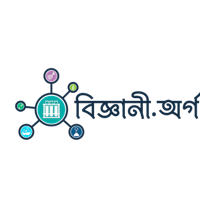
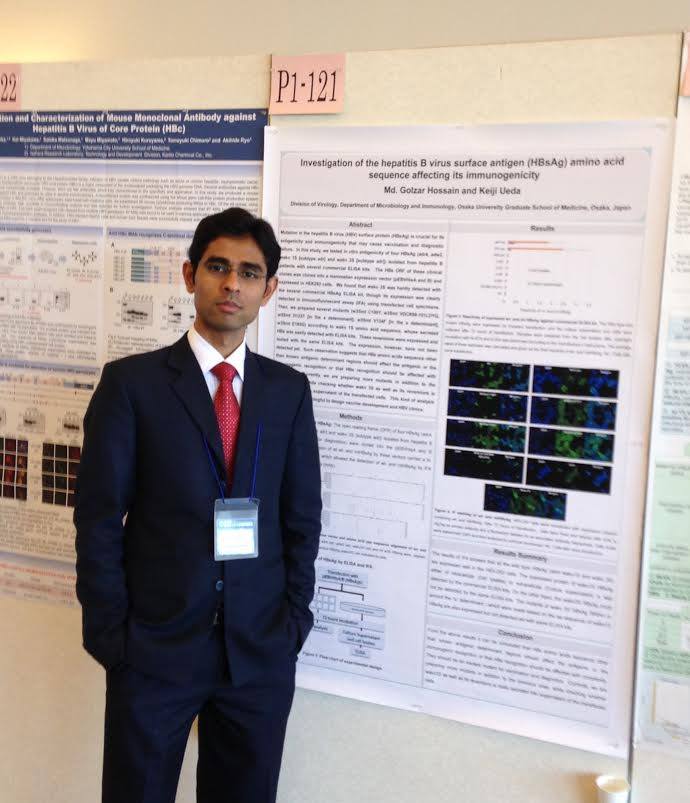

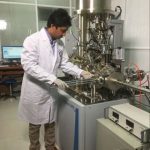

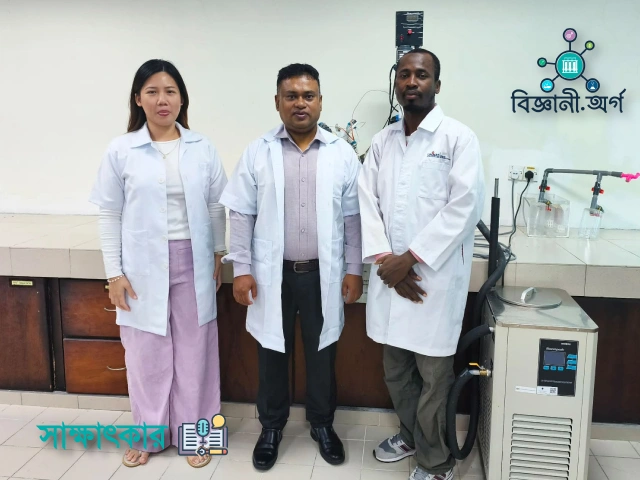
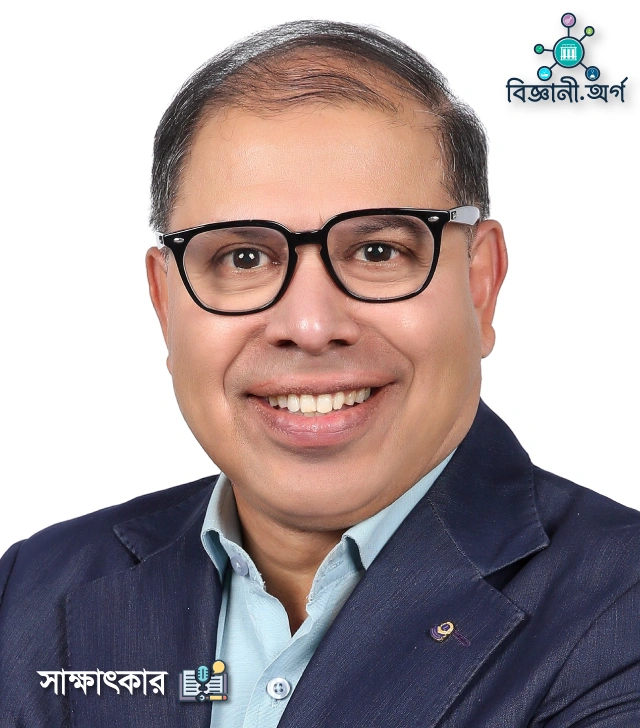
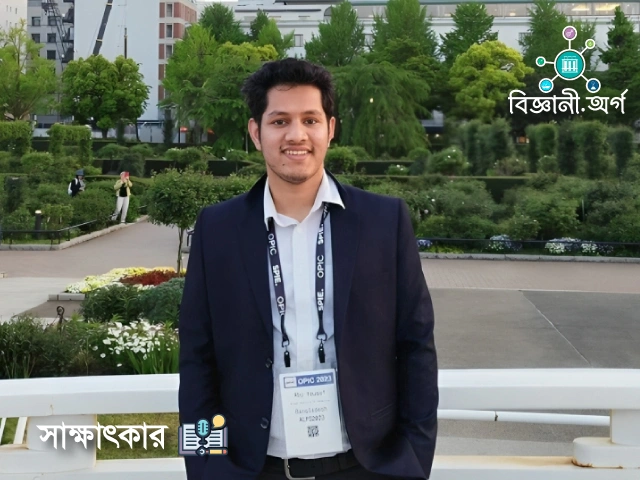
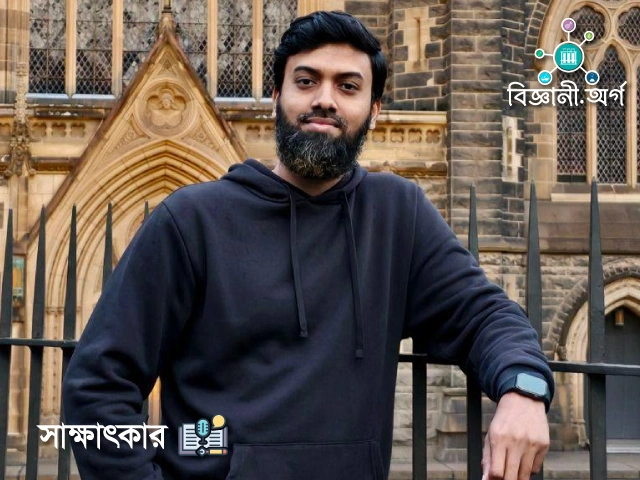

Leave a comment